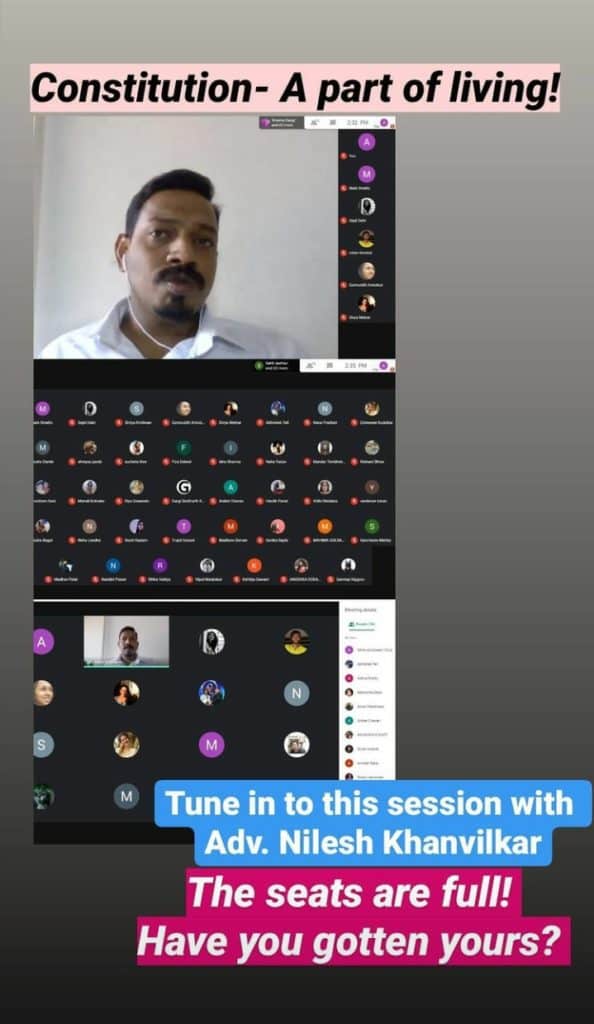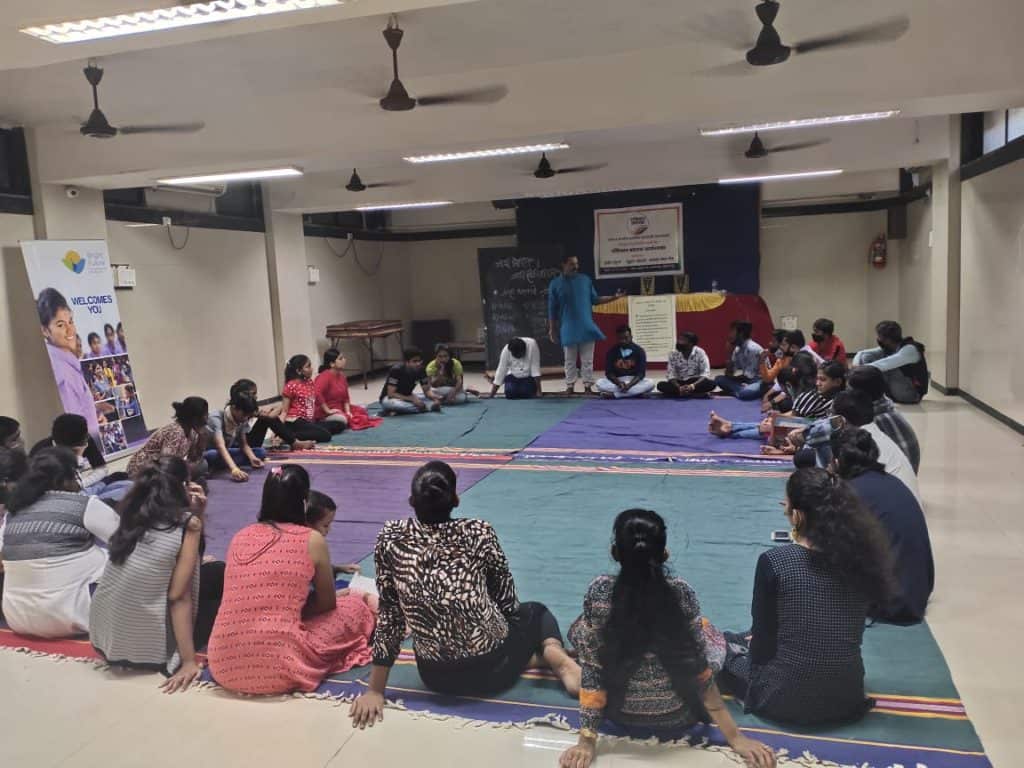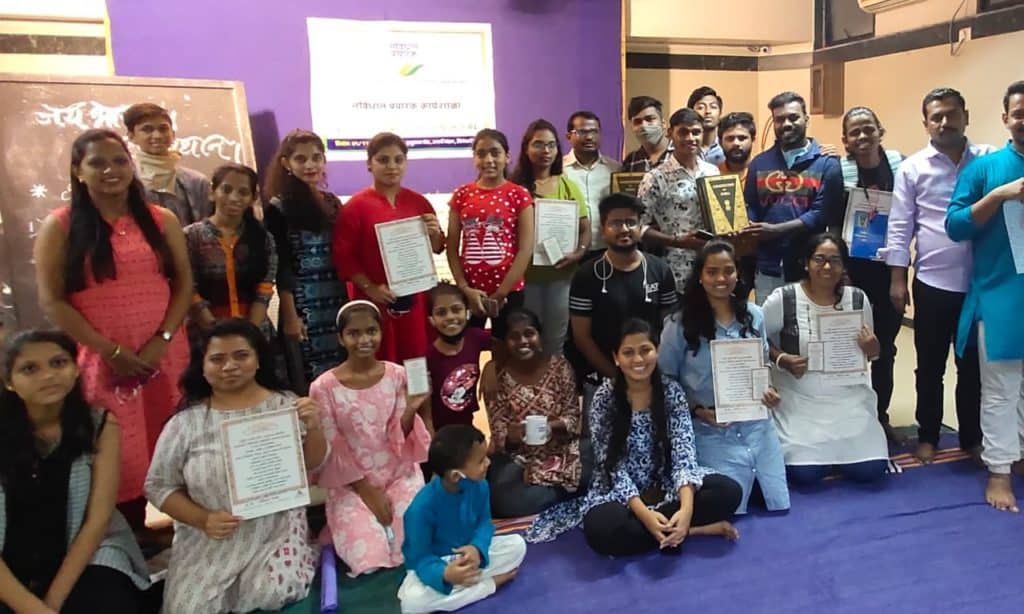Sanvidhan Pracharak, a Mumbai-based group has 20+ volunteers across the Mumbai Metropolitan Region (MMR) who conduct workshops, camps, and one-on-one sessions to propagate Constitutional values among residents in their neighbourhoods.
“A sovereign socialist secular democratic republic?” Asmita Sharma, a volunteer with Sanvidhan Pracharak, asks. “Do most of us know what this means?” It’s the second line in the Preamble to the Constitution of India, but Sharma says that the words are lost on many.
The Indian Constitution lays down the framework of the country’s political procedures, powers and structures. It also sets out the directive principles, citizens’ duties as well as fundamental rights. But the Constitution is more than laws, it’s the coming together of values such as justice, equality, liberty, fraternity, Sharma says. “Humanity is the essence of the Constitution but we have forgotten these values.”
After a decade-long career in Information Technology, Sharma, a Panvel resident, now volunteers with the group to educate more people about the cardinal document that governs India.
Even though a nationwide lockdown has barred physical sessions, Sanvidhan Pracharak’s work has not ceased. “If we reached a 1,000 people in 2019,” Kavita Khajanekar, coordinator for the western Mumbai suburbs says, “we have already reached over 2,000.” The COVID-19-induced lockdown has given an unusual fillip to a group of volunteers spreading awareness about the Constitution of India.”We are conducting multiple batches of the same workshop as more people are interested in learning,” Nilesh Khanvilkar, advocate and a trainer with the volunteer group, says. “People find it easier to log on to a web conferencing app and attend the sessions online.”

Disseminating Constitutional values
Two years ago, a few activists from different organisations met at a workshop explaining the Indian Constitution in Pune. They looked around at the 50-odd people in attendance and decided that the knowledge in the room needed to travel outside. The workshop propelled Kavita, Nilesh, Pravin Jathar (co-ordinator for Panvel), among others to launch a “people’s movement” to disseminate Constitutional values. “Many people joined us and started replicating the teaching in their neighbourhood,” Nilesh says.
A network marketing model was set up with a focus on personal interactions. Volunteers trained by Sanvidhan Pracharak disseminate awareness in their own neighbourhoods through person-to-person discussions.
While every word such as secular, socialist, republic is unravelled and explained, the initial focus of these sessions or discussions remains on values, not the nitty-gritties of the law, Pravin says. The scope, however, can be elaborated to ensure that the discussions are not hamstrung by a hardbound document full of legalese.
“People also sign up for longer camps or train the trainer programmes where we explain the fundamental articles, fundamental duties, and directive principles,” Nilesh says. “We talk about the here and now: Why was there a lockdown, for example? We explain its constitutional validity under Article 19.” The recent discussions have hovered around the Farm Bills, Nilesh says, but at no time were the discussions as riveting as during the CAA-NRC protest. “During a workshop, we ask people who is a citizen. All hands go up. But at the time of protests, we would get a lot of questions from people about the idea of citizenship.”
Current affairs and the prevailing political mood determine how different one discussion might be from the other, but Kavita clarifies that their focus on values creates an atmosphere where no ideology gains precedence. Yet there are plenty of progressive topics. “We explain the time in which the Constitution was written, what were the prevailing conditions, and why certain decisions had to be taken. Take reservations, for example. People don’t know why reservations are needed,” Pravin says.
The unswerving focus remains on creating awareness. “Very few people know or understand the constitution even at a basic level. We want to change that,” Nilesh says. “People should know so that they can prevent politicians from misusing the Constitution.”

Creating an informed citizenry
One of Sanvidhan Pracharak’s goals in conducting workshops or awareness camps is to create a more informed citizenry. And that’s an idea rooted in as much theory as practice.
There are two modern ideas of citizenship, according to renowned Political Science Professor Ronald Beiner: the liberal-individualist type which believes that people’s primary aim is to secure themselves economically and are therefore politically passive. And the civic type which believes that citizens are active and concerned about public affairs. “Most people today live as citizens according to the liberal-individualist conception but wished they lived more according to the civic-republican ideal,” Beiner writes in his book Theorizing Citizenship.
Who is a good citizen is almost a philosophical question. Volunteers of the group approach it broadly. For some, Constitutional values have become a part of their personal lives. The Preamble is read out during weddings and has become the most-exchanged gift.

For others, there’s adoption by exploration. “Take the example of freedom of speech,” Asmita says. “A participant told me that the discussion on freedom of speech made her introspect. She realised that while she can speak her mind, so can others. This led her to change how she interacted with her parents at home.”
The volunteers are attempting to simplify the Constitution and take it to local neighbourhoods, to homes. But Kavita concedes that this is not enough. The first step is information, she says, but the next is implementation.
“If democracy is compromised, then we have to question (those in power). But how do we question if we don’t know our rights, our values? After that, it’s about what are people doing with this knowledge.”
Correction: Citizen Matters had wrongly identified Sanvidhan Pracharak as Samvidhan Samvardhan Aani Saksharta Abhiyaan in an earlier version of the story. We regret the mistake.